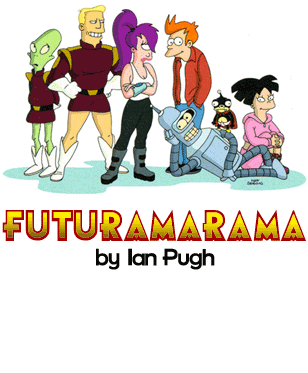 FUTURAMA: BENDER'S BIG SCORE (2007)
FUTURAMA: BENDER'S BIG SCORE (2007)
***½/**** Image A- Sound B+ Extras B
screenplay by Ken Keeler
directed by Dwayne Carey-Hill
FUTURAMA: THE BEAST WITH A BILLION BACKS (2008)
**/**** Image A- Sound A- Extras B-
screenplay by Eric Kaplan
directed by Peter Avanzino
FUTURAMA: BENDER'S GAME (2008)
*½/**** Image A- Sound A- Extras B+
screenplay by Eric Horsted (parts one and two), Michael Rowe & Eric Kaplan (part three), David X. Cohen & Patric M. Verrone (part four)
directed by Dwayne Carey-Hill
FUTURAMA: INTO THE WILD GREEN YONDER (2009)
*/**** Image A+ Sound A Extras C
screenplay by Ken Keeler
directed by Peter Avanzino
by Ian Pugh While Matt Groening with "The Simpsons" had an incalculable effect on how I perceived movies, television, and just about everything else in life, truth be told I probably love his "Futurama" more. What can I say other than that it came at the right time in my life–it was my "Star Trek", my "Buffy", my "Doctor Who": the first sci-fi property to capture my heart, and the avatar into which I poured all my nerdy obsessions. I appreciated its ability to strike a perfect balance of comedy and characterization that legitimized its silliest scenarios. Who would have guessed that the search for a long-lost seven-leaf clover could turn into a touching tribute to brotherly love? Subplots often wore thin and jokes fell flat, but looking back, there isn't a single half-hour in its initial 72-episode run that can be considered an outright failure. Unfortunately, the show never got a chance to shine, placed at a ridiculous timeslot on Fox–Sunday at 7PM, where it was certain to be either pre-empted or overshadowed by Sunday Night Football (jocks vs. nerds!)–and thus doomed to an inevitably short life. The final episode of the fourth season promised that "Futurama" would "see you on some other channel," but the initial salvation came from Fox's home-entertainment division: The producers were offered the chance to do a direct-to-video movie, which was eventually negotiated up to four movies, made and released over a span of three years. Of course, the success of these paved the way for a sixth season due to air on Comedy Central beginning this week, but we're getting ahead of ourselves.

 by Walter Chaw
by Walter Chaw![Easy Rider (1969) [40th Anniversary] – Blu-ray Disc](https://i0.wp.com/filmfreakcentral.net/wp-content/uploads/2010/06/Easy-Rider.jpg?fit=995%2C550&ssl=1)
 by Walter Chaw
by Walter Chaw
 by Bill Chambers
by Bill Chambers by Walter Chaw
by Walter Chaw by Bill Chambers
by Bill Chambers by Ian Pugh
by Ian Pugh by Bryant Frazer
by Bryant Frazer by Walter Chaw
by Walter Chaw by Jefferson Robbins
by Jefferson Robbins by Ian Pugh
by Ian Pugh
 by Alex Jackson
by Alex Jackson